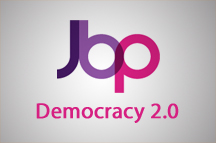 On Monday (26 January), the Speaker’s Commission on Digital Democracy published its report ‘Open Up’ on how Parliament “can use digital technology to help it to become more transparent inclusive, and better able to engage the public with democracy.”
On Monday (26 January), the Speaker’s Commission on Digital Democracy published its report ‘Open Up’ on how Parliament “can use digital technology to help it to become more transparent inclusive, and better able to engage the public with democracy.”
The report has set out five recommendations:
- By 2020, the House of Commons should ensure that everyone can understand what it does.
- By 2020, Parliament should be fully interactive and digital. The 2015 newly elected House of Commons should immediately create a new forum for public participation in the debating function of the House of Commons (i.e. an online debate chamber).
- By 2020, secure online voting should be an option for all voters.
- By 2016, all published information and broadcast footage produced by Parliament should be freely available online in formats suitable for reuse.
- Hansard should be available as open data by the end of 2015.
The commission held roundtables, student forums, meetings of the commissions and received written contributions to create to gather opinions about digital democracy.
The commission has been headed up by the Speaker John Bercow, who is known for being a reformer and a parliamentary radical. This report stems from his desire to “drag Parliament into the 21st Century”.
JBP Analysis
Certain elements of Parliament could be viewed as outdated and it is therefore important that Parliament reviews and challenges its own system of democracy. The online tool, TheyWorkForYou, is an example of the types of mechanisms that have evolved from the public’s desire to democratise the means of communication and information. If even some of the objectives listed out in this report are achieved, Parliament will be working towards meeting the public’s expectations in relation to access to political information and understanding of the system. Indeed the most radical change they cite is the drive for online voting by 2020. In a world where we live our lives through technology more and more, why not vote online? With turnouts steadily declining perhaps this is the revival our democracy needs. It certainly seems anachronistic that the General Election is always held on a Thursday - making voting an easy access ‘instant demand’ service would undoubtedly change the way political parties interact with the public. However, Parliament should be aware of the pitfalls of online participation and it is good that the Speaker has acknowledged that “technology in itself is not a panacea.” Parliament should be conscious that opening itself up could lead to abusive or insincere opinions. Social media tools such as Twitter have to some extent demonstrated themselves as self-reinforcing ‘echo chambers’ of opinion – meaning people only listen to what they want to hear. Democracy must be guarded against simply creating tools to facilitate this. Aside from online tools, the public are about to get a rare (and controversial, given that many MPs are not happy about it) insight into the workings of Parliament. Starting on Tuesday 3rd February, a four part documentary called Inside the Commons will take a ‘through the keyhole’ look at the lives of MPs. |














